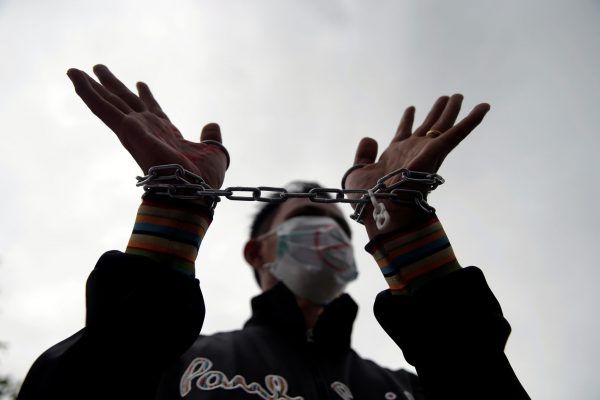Among them are journalists Aye Nai and Pyae Phone Naing from the Democratic Voice of Burma and Thein Zaw from the Irrawaddy newspaper, who have been languishing in prison since late June 2017 after being arrested at a military checkpoint in the northern Shan State.
The three journalists, who were travelling through the conflict-ridden region to report on a drug burning ceremony, have been charged with having had ‘illegal contacts’ with one of the region’s ethnic armed groups and face a jail term of up to three years. The case has sparked an outcry among media workers and civil society both inside and outside the country, who see the arrests as a blatant attack on press freedom.
Sadly, this is not an isolated case. Despite Myanmar’s much-vaunted transition away from outright military rule and the rise of the NLD, being a journalist in the country is still a dangerous line of work.
There is no question that Myanmar’s media scene has changed for the better since the implementation of widespread reforms. Gone are the days when only a handful of outlets existed and when newspapers would come back decimated by the censor’s scissors and red marker after a pre-publication ‘check’.
Such outright repression is no longer and today there is a range of broadcast, online and print outlets in the country. These outlets to a large extent have been allowed to cover subjects previously strictly off-limits, such as human rights or allegations of official corruption.
Yet, there are still clear ‘red lines’ that media workers in Myanmar know not to cross in their reporting. Chief among these is any criticism of the military, in particular when it comes to abuses in conflict-affected areas and the treatment of the Rohingya minority in Rakhine State.
Media workers who voice opinions against the army can face harassment, criminal charges or even jail time. Just weeks before the arrests in Shan State, an editor and a reporter with The Voice Daily — Kyaw Min Swe and Kyaw Zar Naing — were also detained and charged with defamation, over a satirical article that mocked a military-made propaganda film.
Foreign journalists have also faced repercussions for their writing. In 2016, for example, a British reporter was fired by the Myanmar Times after reporting on sexual violence by state security forces angered the military.
There are also signs that the NLD-led government is growing increasingly thin-skinned when it comes to criticism. In 2017, several prominent politicians have lodged complaints with the Press Council in response to news and other reports they deemed ‘inaccurate’ — a clear attempt to intimidate journalists from criticising the government.
In early August, Aung San Suu Kyi — Myanmar’s de facto political leader — told a group of villagers in a speech aired on the state broadcaster, that if they wanted to understand the government they should ‘read the newspapers and listen to the news … released by the government’. It was a remarkable statement from someone who spent years being demonised by the same state-run media when leading the country’s pro-democracy movement.
While the NLD did take initial steps towards reforming some of the most repressive laws when it first came to power, today these efforts have all but stalled.
Instead, the government is overseeing an alarming surge in cases of ‘online defamation’ launched under the 2013 Telecommunications Act, often targeting people — including journalists — who have made social media posts deemed to be offensive. While most of these cases have been brought by private individuals rather than state officials, the authorities have so far failed to curb prosecutions.
One of the Act’s latest victims is Swe Win, a highly respected journalist and the current editor of the news website Myanmar Now, who was arrested at Yangon’s airport in late July 2017. His only ‘crime’ was a Facebook post criticising a hardline nationalist Buddhist monk for praising the murder of a Muslim lawyer earlier this year. Swe Win could face up to three years in prison if found guilty on defamation charges.
Myanmar faces a range of human rights challenges and to address these it will need a free press and community of activists who can operate peacefully without fear of repercussions. While the NLD government might be tempted to lash out against journalists in the face of mounting criticism, such a reaction would be disastrous for human rights.
Myanmar needs to put behind decades of oppression and replace it with respect for, and protection of, human rights. It needs work towards building an enabling environment for media workers and the right to freedom of expression more generally. The very first steps should include dropping criminal charges against journalists doing their jobs or voicing an opinion and to reform the legal framework that is fuelling this repression in the first place.
James Gomez is regional director for Southeast Asia and the Pacific Director at Amnesty International.

